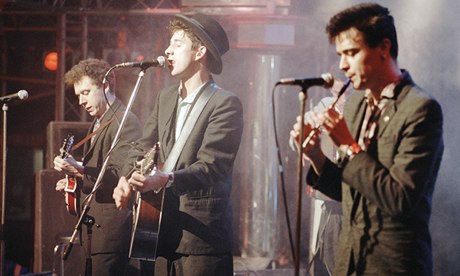The Pogues: 30 Years – review
(WEA)

His writing developed at an incredible pace … Shane MacGowan with the Pogues. Photograph: ITV/REX
In 1984, not long before the first album in this nine-disc, career-spanning box set was released, the Pogues made their television debut on an ITV regional programme called South of Watford. Watching it now, you get the feeling the show was trying to make sense of a band who had inexplicably chosen to start playing Irish folk music at a time when the folk scene was supposed to be in a state of terminal decline. It first suggests, a little unconvincingly, that the Pogues are part of an ongoing pub-rock revival. Then it sets them up as paragons of authenticity in an MTV world: they are, it approvingly notes, "ignoring the accepted rules of synthesiser, pop and video".
In reality, the Pogues were no more authentic than the artists they were supposed to oppose. Hailing from such far-flung corners of the Emerald Isle as Eastbourne, Stoke-On-Trent and Salford, the band's members nevertheless dressed up, as frontman Shane MacGowan put it, in clothes that were equal parts "Brendan Behan and typical Irish granddad". Furthermore, mention of MacGowan's name virtually guarantees that someone in the comments section will sneeringly mention he was educated at the same prep school as Dan Stevens off Downton Abbey and, briefly, at Westminster. It didn't matter: for one thing, rock and pop music is supposed to be an arena in which anyone can reinvent themselves with impunity. Besides, MacGowan might reasonably argue, he never set himself up as a poet of the working classes so much as an underclass of outcasts – "the junkies, the drunks, the pimps, the whores," as he sang on The Boys From the County Hell – and people from all backgrounds and walks of life end up there. Actively seeking out that world, as MacGowan seemed to, rather than crash-landing there through dreadful misfortune, is certainly a curious lifestyle choice, but no one else in rock history has depicted its inhabitants so vividly or with such empathy as he did in the Pogues' early days: the battered, dying rent boy of The Old Main Drag; the pub drunk, pitifully spilling out his saga of war and lost love in A Pair of Brown Eyes.
At first, MacGowan's writing seemed to develop at an incredible pace. There were flashes of brilliance on the 1984 debut Red Roses for Me, not least Streams of Whiskey, galvanising a paean to alcoholic oblivion as anyone has ever written; but by the time of 1985's Rum Sodomy & the Lash, he was coming up with stuff like the astonishing The Sick Bed of Cúchulainn, a chaotic, gripping phantasmagoria that variously involved pre-Christian Irish mythology, the Viennese tenor Richard Tauber, the disabled 18th-century criminal Billy Davis, Frank Ryan – an Irish republican who ended up entangled with German military intelligence during the second world war – and the Euston Tavern, a London hostelry that's now, a little ironically, an Irish theme pub. Furthermore, he was setting his lyrics to melodies that gave the appearance of having been around forever: there was something remarkably seamless about the way the Pogues' original songs integrated with the traditional material they performed.
There's a sense in which Rum Sodomy & the Lash and its accompanying EP, Poguetry in Motion, were the Pogues' peak. Their next effort, 1987's If I Should Fall From Grace With God, is their best-known and biggest-selling album, not least because of the presence of the deathless Fairytale of New York, as good an example as any of MacGowan's unerring ability to locate the romance in ruined lives. The band's playing was more assured and expansive – previously required to stand and clobber a snare and floor tom, drummer Andrew Ranken was permitted to sit down and play a full kit – but there was the faintest hint that a certain chaotic edge had been lost, although in fairness, you scarcely notice when the songs were as good as Thousands Are Sailingor the remarkable medley Streets of Sorrow/Birmingham Six.
But things were about to go audibly wrong. The arrival of acid house in Britain made an impression on a number of artists, but its impact on the Pogues may have been the most dramatic of all. It didn't affect their music directly, although you can hear a weird faint echo of its sound in the grinding, hallucinatory USA, from 1989's Peace and Love. But his immersion in the rave scene gave their frontman an excuse – or as much of an excuse as MacGowan needed – to start taking vast quantities of LSD on an apparently daily basis. In addition, references to heroin started to creep into his lyrics. His subsequent mental disintegration is harrowingly captured in accordionist James Fearnley's book Here Comes Everybody, but ou could tell something had gone wrong just by listening to the two subsequent albums, Peace and Love and Hell's Ditch: MacGowan was no longer willing or able to come up with songs of the same quality or in the same profusion that he once had. On Peace and Love, the rest of the band covered it up with a degree of success: if guitarist Philip Chevron's Lorelei and the instrumental Gridlock sound like padding, the best track might be Jem Finer's Misty Morning, Albert Bridge. By the time Hell's Ditch was released in 1990, MacGowan's disintegration was so total that producer Joe Strummer was forced to edit his vocals together syllable by syllable – so much for that much-vaunted opposition to the electronic embellishments of the MTV age. The results are so incomprehensible, you boggle at what the original vocal must have sounded like. He managed to rouse himself enough to come up with a brace of memorable songs – the melody of Summer in Siam is particularly lovely – but they were frequently concerned with how much he hated being in the Pogues: the lyrical sharpness was blunted, the empathy replaced by solipsism.
Fearnley's book is so detailed in its depiction of the Pogues' rise and fall that it even tells gives the reader information on the appearance of Shane MacGowan's penis. But it doesn't mention the band's post-MacGowan career at all: tacit acknowledgment of how ridiculous the idea of them continuing without him now seems. The remaining members doubtless reasoned at the time that MacGowan had already been absent in spirit for years before they fired him, and in fact, 1993's Waiting for Herb and 1995's Pogue Mahone aren't bad albums. The songwriting has its moments, and in any other band, MacGowan's former sidekick Spider Stacey would have been a natural frontman. Their downfall is simply that they don't establish a unique enough identity to stop the listener longing for the past.
Perhaps they would have stood a better chance with MacGowan's initial replacement, Joe Strummer, whose brief tenure with the Pogues is commemorated here by a live CD, the only real inducement for someone who already owns the original albums to buy 30 Years. The gig sounds fun, but, equally, you can see why the former Clash frontman was a slightly awkward fit. Strummer was a less ambiguous and troubling figure than MacGowan, whose writing would these days doubtless earn the sobriquet "problematic": you can picture the blog posts trying to square the compassion and identification of The Old Main Drag with the homophobic insults of Transmetropolitan; or the Twitterstorm that would be provoked by the racial epithets that sprinkled his lyrics. Perhaps the truth was that MacGowan had cast such a long shadow that no one, not even a punk legend, could escape it.
The Pogues still exist, with MacGowan back in place. They tour annually in December, an excuse for a nostalgic piss-up. The reviews are usually good, although you can't avoid the sense that MacGowan is being applauded for having thus far proved unsuccessful in killing himself. Listening to this box set, you understand why people are willing to still indulge him. But it's hard not to wish it hadn't turned out differently, however inevitable the outcome was, despite the fact that you can't say MacGowan didn't warn you. "I will not be reconstructed," he snarled defiantly, on Hell's Ditch's opening track Sunny Side of the Street: if nothing else, he's remained true to his word.



No comments:
Post a Comment